Indigenous Mayans in Guatemala have called for a halt on multinational companies coming to their communities and extracting resources.
As more of their people are being deported from the US under the Trump administration, they have said they will particularly resist US companies in their area.
The community has said they are in a battle with big corporations for their ancestral lands.
Chinebal Palestina, a remote settlement of Q'eqchi Mayans in eastern Guatemala, is surrounded by palm oil plantations.
When visitors arrive, the people perform a Mayan-Christian traditional ceremony. A circle of burning candles is surrounded by flowers. The community’s spiritual leader fans a legal document over the flames to bless it.
This piece of paper is precious to them. They said it proves they are entitled to stay here, on their ancestral lands.
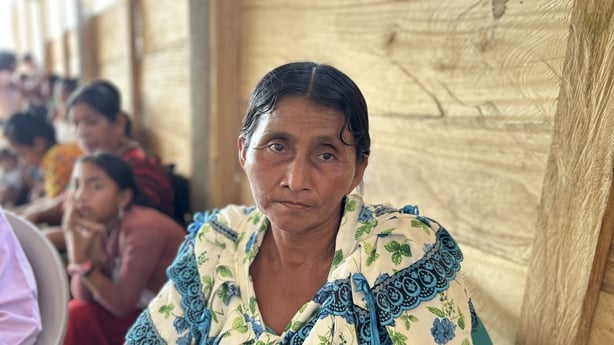
53-year-old Maria Magdalena said in the past they have been forced to leave the area.
"We lost our home, we were homeless," she said. "They were hurting our motherland and we’re trying to save our motherland."
Hermelindo Cux Choc is a legal representative with a group called the Committee of Peasant Unity (CUC). The 47-year-old said he has been fighting for indigenous land rights for thirty years.
"Our slogan is for the big companies to get out of here, to get out of our land. For example, we’ve got the sugar cane, the palm trees. We want them out of our land.
"It’s not true that they bring development."
Irish Aid helps the charity Trócaire support local groups to conduct land registry research, with the aim of fending off large corporations that claim rights to traditional indigenous homelands.
Chris O’Connell, policy adviser with Trócaire, said establishing who has legal title to land in Guatemala and other Central American nations can be a "very difficult" process.
"To put land in a bit of a context - going back to the times of the conquest, what we see is the native peoples being continuously displaced to serve the interests of the wealthier European elites.
"In terms of the difficulty, the poorest people, in particular indigenous peoples, have traditionally never had secure titles to their land."
Mr O’Connell said the Western concept of land ownership is anathema to many indigenous peoples, as they often view land as a common good that supports life, and not something which can be owned by an individual.
"Many times, what we find is communities that occupied lands for decades, even centuries, are told you're not the owners, this corporation or this wealthy individual owns it. And they produce a piece of paper that purports to show that, and then they try to evict them."
The community in Chinebal Palestina has claimed that one day security forces arrived in the area. They said a man was shot dead - 35-year-old Jose Chaman Caal.
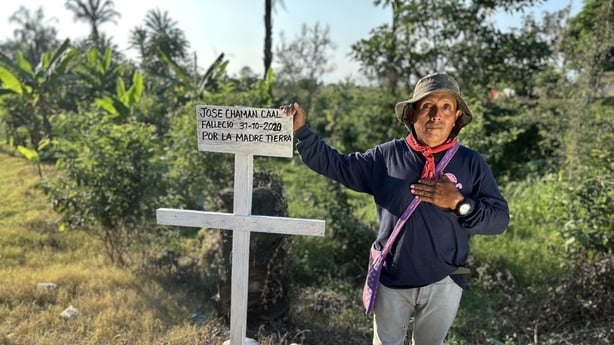
A small distance outside the village, there is a white cross bearing his name. It states that he died for Mother Earth.
Locals have said they felt intimidated and afraid after this. Hermelindo Cux Choc described trying to gain their land rights as like "fighting a monster".
But now the community is more optimistic. They have legal papers that they say will determine the land is theirs, and it will be registered under their name.
Cux Choc said this will be like a "bombshell" for the big companies.
Members of the community believe that big companies have destroyed the natural environment, affecting their crops and water.
When asked what she thinks people in other countries need to understand about production of materials like palm oil, 25-year-old Amarilys Guadalope said she would tell them not to use palm oil.
"If they want to use palm oil, then produce it in their own country, why do they have to produce it in my country? It’s affecting me, not them."
In the mountains in El Estor, another area in Guatemala where indigenous Mayans have lived for centuries, Bautilio Choc points out a mine.
Locals believe the mining company is looking for earth minerals like nickel and chromium.
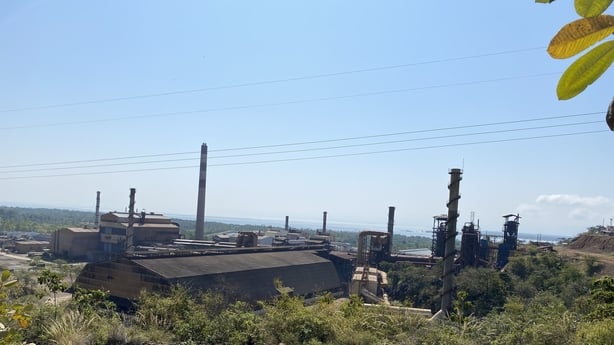
A mine had been operating here in the past but was closed by court order a few years ago. Choc said there has been activity at the mine again recently, and locals think this time it is a US company working there.
Some in the indigenous Maya community have said there was no proper consultation with them.
"They said there was a consultation between the communities, and it was not like that," said Choc. "They just asked three or four people, the mayor, people working for them."
"I don’t think that’s fair. All the community should be part of it, all the community should be asked whether we want them to work here or not."
By Lake Izabal in El Estor, leaders from the indigenous community gathered to discuss the matter.
One elderly man said he will be devastated and cry if there is mining again. The leaders said it causes environmental destruction, and fear it will affect their crops, the air, the water and fish in the lake.
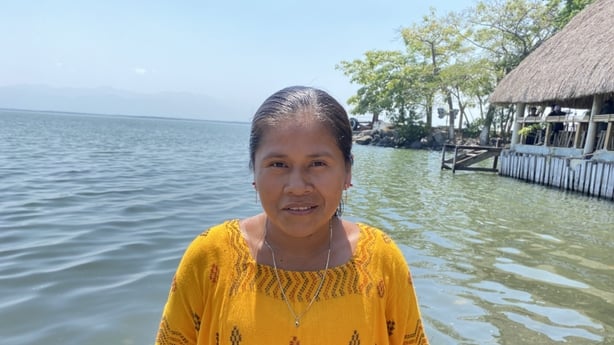
Silvia Patricia Caal said they want the Guatemalan government to listen to their "indigenous request" and stop any more multinational companies extracting resources here.
"I worry a lot because a lot of lives will disappear," she said. "Not only the forest, not only animals, but water."
"What really concerns me is water. Lately in our community, it feels fresh. Fresh air and water. But if they start operations, we’ll have problems because of the dust they discharge when they’re operating.
"Our crops won’t grow well, and we won’t be able to feed our animals."
Just as in Chinebal, the people here have contested claims from big companies that they bring development to the area.
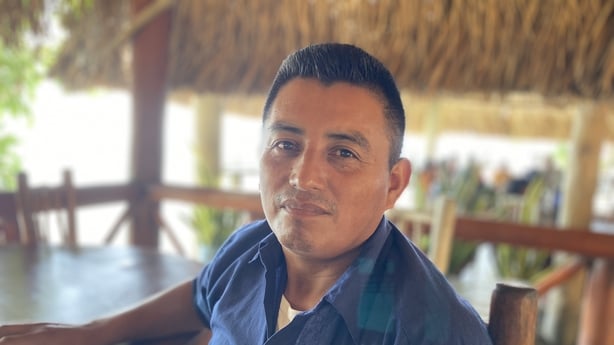
Gabriel Xi Pachán said mining does not provide jobs for his community.
When crops fail and food supplies dwindle, many from this community migrate to the US for work.
"Now they’re being kicked out of the United States, they’re being evicted from there, because of the government they have.
"Now what we’re going to do, we’re not going to let this company that is a US company, come here and get our materials and take them out of the country and ruin our nature.
"We’re angry about that. So, we’re not allowing a US company to come here and do whatever they want to do."







